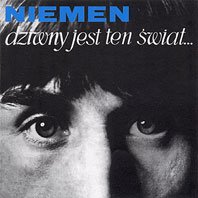I una Marilyn imaginària, com totes les altres, cridava, com a “The Misfits” (1961). Però sense dir res, sense veu. Ahir es feia estrany parlar d’en Ieltsin, com molts d’altres estarien pensant en parlar també d’ell. Vaig recordar fa dies i ahir també una fotografia de la Marilyn al rodatge de “the Misfits”, allà al mig de l’espai, seriosa, amb el cap ves a saber on, ella que a cada imatge semblava tenir un altre rostre, com si hagués estat un bon grapat de persones. Marilyn em confon. Després de parlar d’en Ieltsin i d’en Gorbi ens vam congratular, celebrant les nostres probabilitats de patir un càncer (un dia, sorpresa!) i com els homes de negocis que es feliciten, ens donem una mà. Flaire de mort, d'una mort com els sepulcres pintats de colors en un somni de ja fa uns anys. Millor de colors. O potser sense color, com un elixir bucal incolor. O sense color, com l’acte de rentar-se les dents o com el sexe, que no ve seguit de cap color i pot no tenir cap color, o tenir-ne tants que és com si no en tingués cap. Vam sospitar les nostres agonies perquè sí com qui parla de cuina, o de tofu. Ell parlava de la certesa d'una agonia inimaginablement dolorosa. Un punt de vista des de l'altra banda del mostrador. Jo havia pensat en probabilitats altes però no en certeses d'una cosa per l'estil. Però no és dolent parlar de punts finals que no se sap si són finals. Vaig mirar després rostres de la Marilyn, vaig pensar en Mongòlia. Començo a imaginar-me ara una Marilyn al mig de la plaça Sühbaatar, cridant. Sobta. Em vaig sentir confosa amb tant de rostre i a mesura que passava el dia, m’anava allunyant més i més, caminant per aquella cosa paral·lela o no. Els paisatges més enllà del tren eren més esplendorosos, amb so de vidre. Gent. Es parlà de Nepal. No-no-no...resposta utòpica sobre lluites armades. Com si no...veia un mort, un altre, un altre. Justícies llençades contra la paret, esclafades com globus d’aigua (plaf!). Trossos de goma. Escombra, escombra. Després no hi havia Bangladesh, i m’era aliena la lògica de les dinàmiques a les que m’havia acostumat a sentir a parlar, tot i que l’entenia. Malauradament hi ha aquesta mena de coses per entendre. I vaig esdevenint més inviable. En comptes de sentir la ciutat sota els meus peus, de sentir el sòl quan vaig descalça, sóc més com un globus. Globus contra la paret, globus que es deixa anar. I al matí, parlant d’en Ieltsin, responguérem a la vegada, continuarem a la vegada la meva frase. Seré cada cop més utòpica potser perquè veig que no queda tant, vam concloure a la vegada, com si fos un càlcul matemàtic senzill. I ens congratulàrem. Soja verda i caramels de cafè sense sucre dins d’una bossa blanca. Al vespre, sense haver pogut tornar els peus a les voreres, a les andanes, a les escales, al ciment, a les llambordes, a les rajoles, m’abraçà la veu sempre estranya i magnífica d'en Vice Vukov. Una veu que ho feia tot més estrany encara.
.jpg)
 Could a Reliant Robin be considered cute?How is it that we might be able to find cuteness (かわいさ (可愛さ), kawaisa in romaji transcription), in things considered "ugly" by many? I do find this car "cute" (the older versions, in fact) maybe because of the colourful versions, the simple and unaggressive aesthetics, the vulnerability of being a 3-wheeled creature, its appearance, close to that of some sort of kind creature...
Could a Reliant Robin be considered cute?How is it that we might be able to find cuteness (かわいさ (可愛さ), kawaisa in romaji transcription), in things considered "ugly" by many? I do find this car "cute" (the older versions, in fact) maybe because of the colourful versions, the simple and unaggressive aesthetics, the vulnerability of being a 3-wheeled creature, its appearance, close to that of some sort of kind creature...








